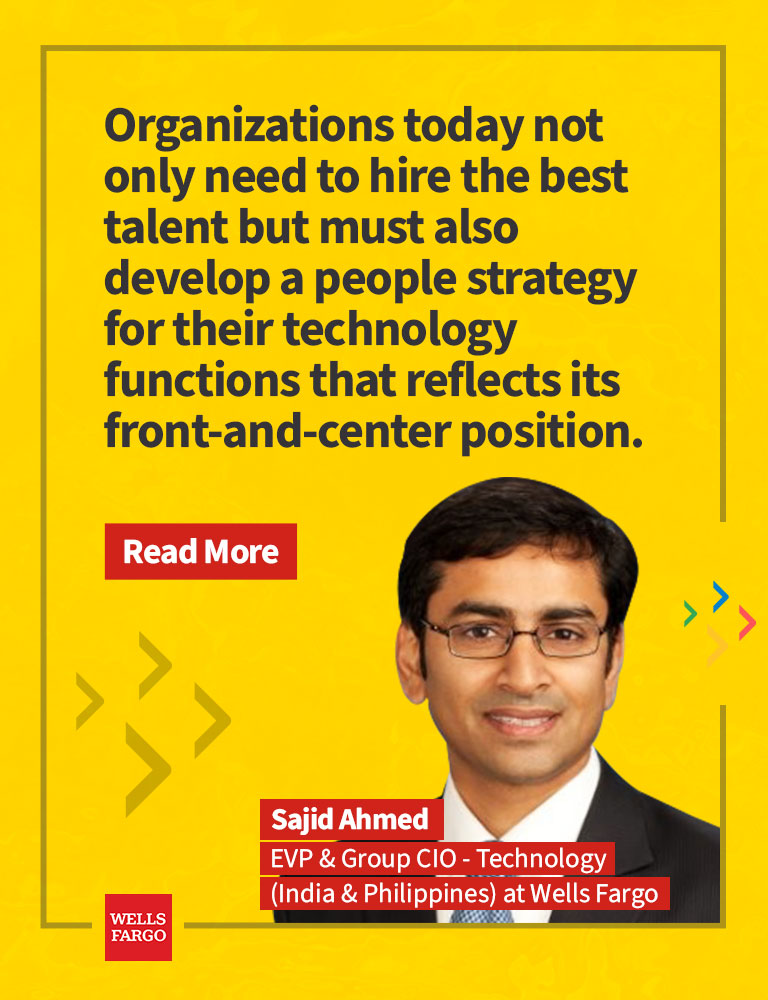Reskill and Upskill Now: The mantra of future-fitting the technology workforce
With increasing digitalization of the global economy, technology has become central to business, and it might not be wrong to say that essentially every company now operates as a Tech company. Further, the technology function is no longer a separate, independent, and siloed entity but strategic to the growth of any organization. Hence, it now becomes critical how we train, manage and engage our technology resources in this digital age via reskilling (which focuses on employees learning new skills for new roles) and upskilling (which focuses on employees learning advanced skills for their current position).
Industry view: Skilling will find a top spot in the leadership agenda

As technologies transform, organizations must enable their people to learn at speed and scale to respond faster to this ever-changing environment. The priority for both organizations and employees will be on reskilling and upskilling in new-age technologies such as AI/ML, Data Analytics, Cloud, IoT, Intelligent Automation and Cybersecurity to have ready and available in-house talent with future-fit skills. Considered niche in the pre-COVID era, these skills are now seen as a basic requirement for digitally-proficient talent.
Estimates by the National Skill Development Corporation (NSDC) indicate that the Banking, Financial Services and Insurance (BFSI) sector in India will need an additional 1.6 million skilled people in the workforce by the end of 2022. A majority are likely to be in technology-driven jobs, making reskilling and upskilling the need of the hour, against the backdrop of a hyper-competitive environment, evolving customer behavior and growing competition. Currently, the demand for these skills far outpaces the supply. Given these industry trends, upskilling, reskilling and a culture of continuous learning will find top spot in the leadership agenda across the industry.
Addressing the skills gap
According to the Centre for Educational Studies and Service (CESS), ~15 lakh engineering students graduate in India every year. And the demand for them is only going up, mainly due to the manner in which technology projects are being organized, requiring development teams to implement scrum and work in an agile manner.
Despite India’s rich demographic dividend that churns out engineers and technologists in large numbers annually, the lack of an updated industry-relevant curriculum and a poor student-faculty ratio mean that new graduates have to learn on-the-job and quickly convert academic training to workplace skills. With rising attrition and surge in demand for new-age skills, there is a critical need for training and deployment at a faster pace to expand the range of in-house skills. Organizations today not only need to hire the best talent but must also develop a people strategy for their technology functions that reflects its front-and-center position. With good technology talent being scarce and tough to attract in today’s competitive market, focusing on forward-looking, skill-based learning strategies to revamp talent will be a good starting point.
The weight of this will not just be shouldered by an organization’s internal training academies and SMEs alone but through partnerships with MOOCs, vendors and online specialists who have the expertise to accelerate learning in a fast-paced environment. A number of options are available for this. FutureSkills Prime (FSP) is a digital skilling platform built by the Government of India & Industry to re-skill/ up-skill the citizens of India. The platform offers a variety of courses including Foundation courses, Deep skilling Courses, Bridge Courses, Courses on Popular Tech Topics and Professional Skills, Programming languages and Virtual Labs etc.
The mandate across all learning avenues will include:
- create future-fit employees today, while addressing skills gaps in the labor market for filling new and existing roles
- enhance employee experience and productivity to achieve business goals faster
- serve customers better to stay ahead of the competition
At Wells Fargo, our technology-focused learning initiative called Technology College was created and launched in December 2020 with a similar focus. The method of delivery is a mix of classroom and self-based learning, complemented by extensive sandbox environments for hands-on training to ensure our Technology employees are equipped with skills through best-in-class courseware. This initiative won us the Silver Stevie Award for Great Employers in the ‘Achievement in Competencies and Skill Development or Management’ category in 2021.
Future-fitting the technology workforce
As technology evolves and adoption increases multifold, the World Economic Forum predicts that 50% of all employees will need reskilling by 2025. While the pandemic continues to demand agility from organizations and employees alike, digital transformation triggered during this time is only beginning to gain momentum now.
Employees too are competitive, motivated about their learning, growth and career advancement, and are urging organizations to provide opportunities to develop knowledge, business intelligence and other skills to be eligible for cross-domain and cross-functional stints and meet new challenges.

With no dearth of core engineering jobs and with employees having the power to be selective, compensation and benefits will not be the only deciding factor. An opportunity to learn and develop new skills and deliver cutting-edge technology projects driven by innovation will be seen as a priceless perk to attract the best engineers to any organization as well as serve as a catalyst for internal mobility and employee retention. Now is the time to build a talent pool that can flex to meet changing labor market dynamics to align with current and future demands. And organizations that can best leverage this shift in technologies and talent today will crack the code.
Written by Sajid Ahmed, EVP and Head of Technology India & Philippines, Wells Fargo


